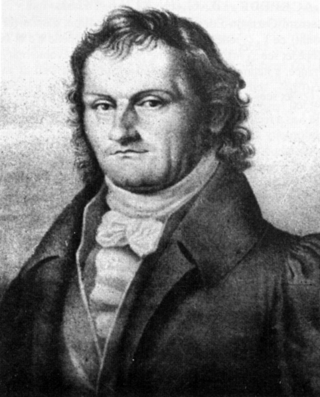See also
Name list
This page or section lists people that share the same given name. If an internal link led you here, you may wish to change that link to point directly to the intended article.
Gottlob is a family name, which may refer to:
Gottlob is a given name, which may refer to:
Gottlob as a middle name may refer to:
Gottlob may also refer to the following places:

Christian Gottlob Heyne was a German classical scholar and archaeologist as well as long-time director of the Göttingen State and University Library. He was a member of the Göttingen school of history.

Johann Gottlob Theaenus Schneider was a German classicist and naturalist.
This article contains information about the literary events and publications of 1802.
Fabricius is a surname. Notable people with the surname include:
Johann, typically a male given name, is the German form of Iohannes, which is the Latin form of the Greek name Iōánnēs (Ἰωάννης), itself derived from Hebrew name Yochanan in turn from its extended form Yehochanan, meaning "Yahweh is Gracious" or "Yahweh is Merciful". Its English language equivalent is John. It is uncommon as a surname.
The German word Müller means "miller". It is the most common family surname in Germany, Switzerland, and the French départements of Bas-Rhin and Moselle and is the fifth most common surname in Austria. Other forms are "Miller" and "Möller". Of the various family coats of arms that exist, many incorporate milling iconography, such as windmills or watermill wheels.
Zumpt is a surname. Notable people with the surname include:
Lehmann is a German surname.
Schulze is a German surname, from the medieval office of Schulze, or village official. Notable people with the surname include:

Count Adam Gottlob von Moltke was a German-born Danish courtier, statesman and diplomat, and Favourite of Frederick V of Denmark. Moltke was born at Riesenhof in Mecklenburg. His son, Joachim Godske Moltke, and his grandson, Adam Wilhelm Moltke, later served as Prime Minister of Denmark.
Adam is a surname.
The German given name Johann Georg, or its variant spellings, may refer to:

Johann Gottlob Leidenfrost was a German physician and theologian who first described the scientific phenomenon eponymously named the Leidenfrost effect.
Gottlieb is a theophoric name that is used as a surname or as a male given name. Gottlieb appeared in High German in the 17th century, in German speaking parts of Europe. It was a product of the age of pietism, giving young men a religiously charged name. Earlier forms of the name are attested from the 6th century in the Gothic language as Gudilub, normalized as 'Gudaliufs'.

St. Thomas School, Leipzig is a co-educational and public boarding school in Leipzig, Saxony, Germany. It was founded by the Augustinians in 1212 and is one of the oldest schools in the world.
Johann Gottlob Lehmann may refer to:

Joachim Godske von Moltke was the Prime Minister of Denmark from 1814 to 1818. He was also father of Prime Minister Adam Wilhelm Moltke and the son of Danish diplomat Adam Gottlob Moltke.

The Wilhelm-Ernst-Gymnasium is a secondary school on Herderplatz 14 in Weimar, Germany. Founded in 1712 by Duke William Ernest of Saxe-Weimar, it is the oldest school building in the city. Numerous notable figures such as Johann Gottfried Herder, Johann Heinrich Voss, Friedrich Wilhelm Riemer and Johann Karl August Musäus studied here. It is a designated historic site and is one of the few secular buildings of the pre-classical period still remaining in Weimar. It is prominently located in the urban center and is one of three sites forming the UNESCO World Heritage Site Classical Weimar, created in 1998.

The Palais Universitaire in Strasbourg is a large, neo-Renaissance style building, constructed between 1879 and 1884 under the direction of the German architect Otto Warth. It was inaugurated in 1884 by Wilhelm I, Emperor of Germany. Through Avenue de la Liberté, it faces the equally monumental former imperial palace (Kaiserpalast).
Ernesti is a surname. Notable people with the surname include: